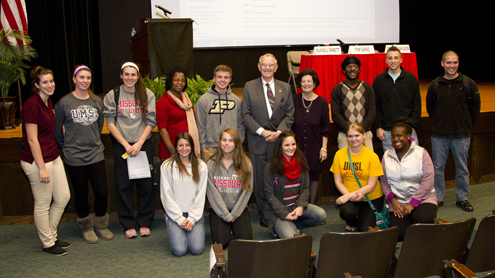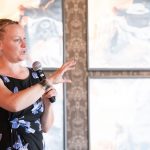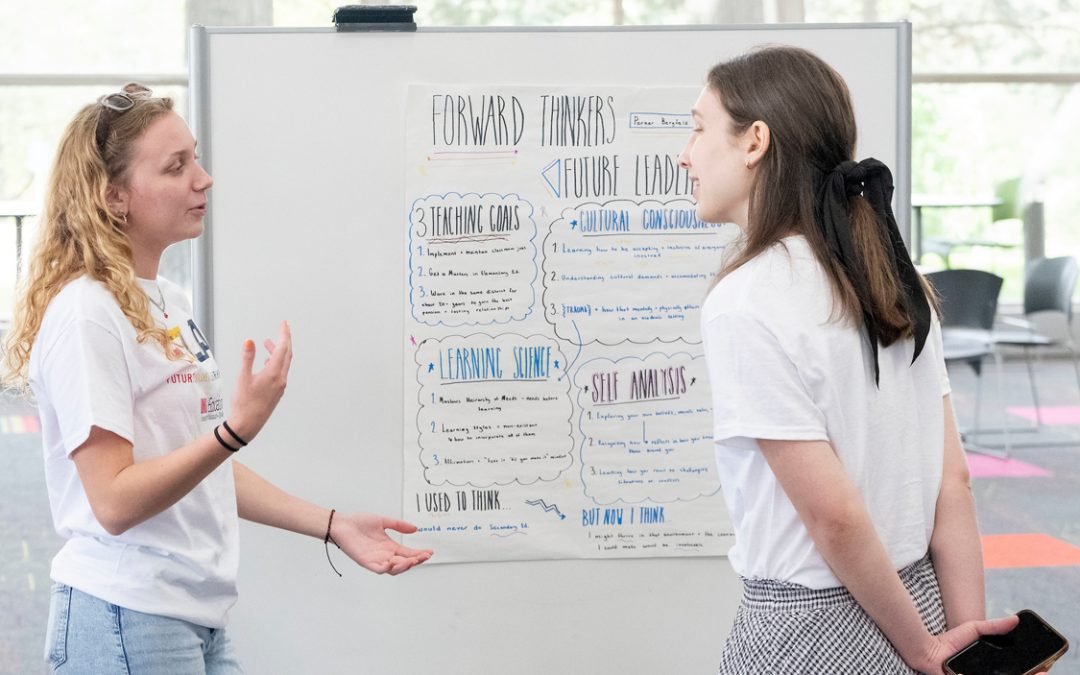
Will and Hellen Carpenter pose with UMSL biology students before the lecture “Facing the Unthinkable: Water Management Strategies,” part of the semiannual Hellen and Will Carpenter Series on Contemporary Issues in American Society at UMSL. (Photo by August Jennewein)
Though many Americans have not heard of the Organization for the Prohibition of Chemical Weapons, the group finally got its deserved time in the limelight last weekend when it collected the Nobel Peace Prize in Oslo, Norway. University of Missouri–St. Louis supporter Will Carpenter is particularly pleased for the group’s recognition, which makes sense, seeing as how he played an integral role in creating the treaty that lead to the formation of the OPCW.
In 1978 Carpenter was serving as director for Market Development for Monsanto when the government reached out to him to help create a worldwide chemical weapons treaty. Carpenter says the United States tapped him for the job because the chemical industry had become so complex that across the world many facilities manufacturing everyday products could, in the wrong hands, be used to make chemical weapons. Therefore, private industry had to have just as prominent role in the process as government.
It took 15 years, but the treaty was signed by 65 nations in Paris in 1993.
“The treaty not only had to ban chemical weapons,” Carpenter says. “But it also had to deal with all those chemicals that go into chemical weapons, and then there are all the chemicals that go into making the chemicals that make the weapons.”
Couple that with the fact that most of those potentially dangerous chemicals are also used to make products like ink pens and pants, then the full complexity of the task handed to Carpenter in 1978 starts to take shape — and taking 15 years to bring all parties together starts to sound downright speedy. In fact, the treaty Carpenter helped draft has been called by many scholars “the most complex treaty in human history.”
“Like most things in life, the treaty was a compromise,” Carpenter says.” It had to be tough enough to do real good, but it had to be done in the framework of the least possible damage to industry.”
Since 1993, an additional 125 nations have signed on, bringing the OPCW’s total number of member nations to 190.
Before starting at Monsanto, Carpenter earned his PhD in plant physiology at Purdue University. But before Purdue, Carpenter was a junior college student at a small two-year school in his hometown of Moorhead, Miss.
It’s probably because of those roots, Carpenter says, that he’s always felt a connection to UMSL’s student body and especially those who transfer from community college. Carpenter was first introduced to UMSL in the 80s by Chuck Granger, Curators’ Teaching Professor of Biology and Education, who served with Carpenter on the Board of the Academy of Science St. Louis. Together Granger and Carpenter started the Regional Institute for Science Education and held numerous events and symposiums aimed at high school aged science students and their teachers. From there, Carpenter and his wife Hellen began funding scholarships for UMSL students and more recently have even created a lecture series. Carpenter has also served as chair for the College of Arts and Sciences Dean’s Leadership Council.
“A whole pot load of UMSL folks are from community colleges, and in essence, I’m a community college person too,” Carpenter says. “I can relate to that.”
The ties between UMSL and Will Carpenter became even stronger in 2013 when UMSL awarded him an Honorary Doctorate in Science.
“Will Carpenter is a generous, wise and dedicated supporter of the University of Missouri–St. Louis,” said Deborah Godwin, director of development for the College of Arts and Sciences. “It is a pleasure working with Will and his wife Hellen, who give so much of their time and talent in support of our students.”
Click here to read a UMSL Magazine article about Will and Hellen Carpenter.














